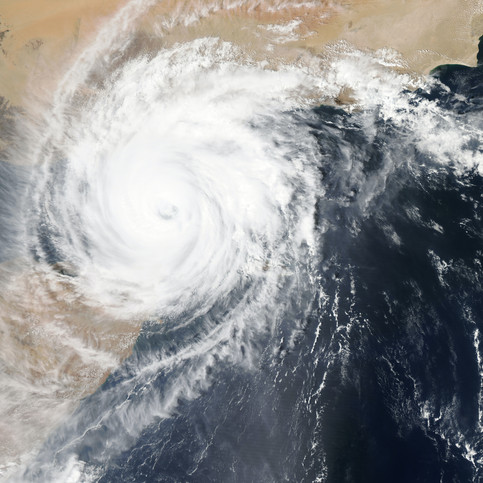By: Isabela Claret Torres, MSc, Ph.D.
Climate Change
The costs of climate change are vast and continuing to grow. Over 99% scientific articles agree that the climate of the earth is changing and there has been a rise in temperatures due to the emission of greenhouse gases due to the use of fossil fuels among other contributors. A study conducted by Oxford University showed that 64% of the world population believes that climate change is a global emergency and call for actions. Besides this numbers one fact is real, many countries have experience the effects of climate change through never seen before flooding, droughts, destructive hurricanes in Florida, out of control wildfires in Australia, severe storms, sea level rise, etc.
Economic Costs of Climate Change
The costs of climate change and natural disasters are immense. Hurricanes have cost over $1.1 trillion total, with an average cost of $20.5 billion per event during the period from 198002021 in the USA. The costs of flooding in Europe have a value of €6.4 billion per year according to a report of 2013, the values are probably much higher now. The Australia bushfires in 2019-2020 had a cost of for the agriculture between $4 billion and $5 billion while the total amount was around $20 billion dollars. In the other side of the world in California the costs of the 2018 wildfires had an economic damage totaled $148.5 billion. World Economic Forum (WEF) says that drought across the globe costs six to eight billion dollars a year from losses in agriculture and related businesses. Moreover, according to Morgan Stanley, climate-related disasters cost the world $650 billion from 2016-2018
United States
These numbers are staggering, and the tendency is to rise. Many think that the cost to fight global climate change is higher than the cost of its impacts but it is not true. In the US, President Joe Biden called for nearly $45 billion in new funding for climate change, clean energy and environmental justice programs. The Organization for Economic Co-operation and Development (OECD) puts the cost of achieving the UN’s Sustainable Development Goals, in a way compatible with Paris, at $6.9 trillion a year, to 2030.
Data from the White House states that in USA the floods, drought, wildfires and hurricanes due to climate change could cost the U.S. federal budget about $2 trillion each year by the end of the century.

US damages are expected to cost:
- Hurricane damages: $422 billion in economic losses caused by the increasing intensity of Atlantic and Gulf Coast storms.
- Real estate losses: $360 billion in damaged or destroyed residential real estate as a result of rising sea levels.
- Energy costs: $141 billion in increasing energy costs as a result of the rising demand for energy.
- Water costs: $950 billion to provide water to the driest and most water-stressed parts of the United States as climate change exacerbates drought conditions and disrupts existing patterns of water supply.
This data is only for USA alone. We should consider that although rich countries are the greatest responsible in per persons greenhouse emissions, the poorest countries in the world will have more damages due to climate change that will exceed their national income.
Costs of Climate Change in Asia
After the US, Asia is most exposed to the costs of climate change, absorbing $180 billion in economic damages, equal to 0.24 percent of regional GDP, Morgan Stanley says.
The impacts of climate change over the next few decades will largely be driven by greenhouse gases already in the atmosphere. The UN Environment Program estimated in 2016 that the global cost of adapting to these climate impacts is expected to grow to $140-300 billion per year by 2030 and $280-500 billion per year by 2050. Global infrastructure investment would cost $90 trillion by 2030.
In fact, the estimated costs of climate change from warming in 2100 for 1.5°C and 2°C were $54 trillion and $69 trillion, respectively, relative to 1961–1990.
An article published in the Journal Nature Communications showed even higher numbers. Wei et al. (2020) showed that if we fail to reduce greenhouse gas emissions to the levels designated by the Paris Agreement, the economic cost would range from $150 trillion to as much as $792 trillion by 2100. The net benefit of climate change mitigation would be $127 trillion to $616 trillion by 2100 .
In another scientific paper published in Environmental Research Letters, Kikistra et al. (2021) evaluated the social cost of carbon dioxide under climate change. As stated by Brierley, one of the authors “Burning CO2 has a cost to society, even if it is not directly to our wallets. Each person’s emissions could quite well result in a cost to humanity of over $1,300 per year, rising to over $15,000 once the impacts of climate change on economic growth are included”.
Social Cost of Carbon
The authors calculated the effect of these changes on the ‘social cost of carbon’ (SCCO2), a crucial indicator of the level of urgency for taking climate action that calculates the economic cost of greenhouse gas emissions to society. Expressed in US dollars per tonne of carbon dioxide, estimates currently vary greatly between $10 to $1,000. However, when taking more robust climate science and updated models into account, this new study suggests that the economic damage could in fact be over $3,000 per tonne of CO2. The authors found that the economic damage could be six times higher by the end of this century than previously estimated.
As we can see the values are high and the cost of climate change affect everyone – all of us will pay. We need to take action now. Everyone can do something to tackle climate change. As I always said if each of us do a little we can accomplish a lot. It depends on the governments to implement policies. But also depends on us to make better choices and reduce our carbon footprint. If we don’t do anything the costs will be high and we all will share the bill.
About the Author:
Isabela started her work with the environment in 1993 as a Biology Bachelor student at the highly regarded Federal University of Minas Gerais (UFMG/Brazil). Later she joined the Graduate Program on Ecology, Conservation and Management of the Wildlife of the same University (UFMG/Brazil) where she received her Masters degree in 1999. Later, she received her Ph.D. on Soil and Water Science at the University of Florida (USA). During her Ph.D. studies she received an Outstanding Student Poster Award at the ASLO (American Society of Limnology and Oceanography) 2006 Summer Meeting held in Victoria (Canada). After working for the State Government Secretary, consulting environmental company and watershed management company she began her post-doctorate in the Geography Department at UFMG (Brazil). Throughout her career she gathered knowledge and specialized on Biology, Ecology, Soil Science, Limnology, Paleolimnology, Biogeochemistry, Organic Geochemistry, Metal and Environmental pollution.
References:
Kikstra JS, Waidelich P, Rising J, Yumashev D, Hope C, Brierley CM. (2021). The social cost of carbon dioxide under climate-economy feedbacks and temperature variability. Environmental Research Letters https://doi.org/10.1088/1748-9326/ac1d0b
Wei Y-M, Han, R, Wang C, Yu B, Liang Q-M, Yuan X-C, Chang J, Zhao Q, Liao H, Tang, B, Yan, J, Cheng L & Yang Z. (2020) Self-preservation strategy for approaching global warming targets in the post-Paris Agreement era. NATURE COMMUNICATIONS https://doi.org/10.1038/s41467-020-15453-z
Ten facts about the economics of climate change and climate policy (brookings.edu)
Climate change could cost U.S. $2 trillion a year by 2100: White House (cnbc.com)
NRDC: The Cost of Climate Change, report (pdf)
The Cost of Tackling Climate Change Is Less Than the Cost of Doing Nothing (treehugger.com)
Energy & Climate Intelligence Unit | Climate economics – costs and… (eciu.net)

